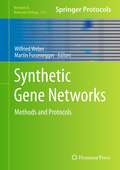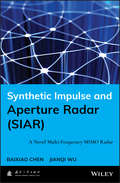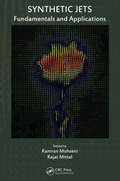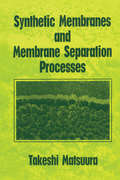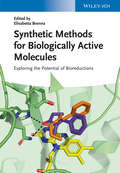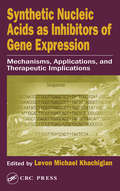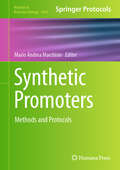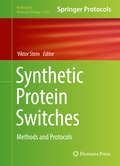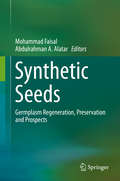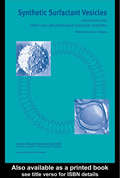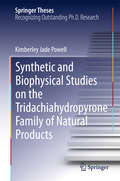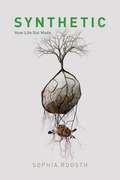- Table View
- List View
Synthetic Gene Circuits: Methods and Protocols (Methods in Molecular Biology #2229)
by Filippo MenolascinaThis volume provides clear and direct protocols to implement automated Design-Build-Test-Learn (DBTL) into synthetic biology research. Chapters detail techniques to model and simulate biological systems, redesign biological systems, setting up of an automated biolaboratory, step-by-step guide on how to perform computer aided design, RNA sequencing, microfluidics -using bacterial cell free extracts, live mammalian cells, computational and experimental procedures, metabolic burden, computational techniques to predict such burden from models, and how DNA parts can be engineered in mammalian cells to sense, and respond to, and intracellular signals in general. Written in the highly successful Methods in Molecular Biology series format, chapters include introductions to their respective topics, lists of the necessary materials and reagents, step-by-step, readily reproducible laboratory protocols, and tips on troubleshooting and avoiding known pitfalls. Authoritative and cutting-edge, Synthetic Gene Circuits: Methods and Protocols aims to ensure successful results in the further study of this vital field.
Synthetic Gene Networks
by Martin Fussenegger Wilfried WeberThe rapid expansion of synthetic biology is due to the design and construction of synthetic gene networks that have opened many new avenues in fundamental and applied research. Synthetic Gene Networks: Methods and Protocols provides the necessary information to design and construct synthetic gene networks in different host backgrounds. Divided into four convenient sections, this volume focuses on design concepts to devise synthetic gene networks and how mathematical models can be applied to the predictable engineering of desired network features. The volume continues by highlighting the construction and validation of biologic tools, describing strategies to optimize and streamline the host cell for optimized network performance, and covering how optimally designed gene networks can be implemented in a large variety of host cells ranging from bacteria over yeast and insect cells to plant and mammalian cell culture. Written in the successful Methods in Molecular BiologyTM series format, chapters include introductions to their respective topics, lists of the necessary materials and reagents, step-by-step, readily reproducible protocols, and notes on troubleshooting and avoiding known pitfalls. Authoritative and easily accessible, Synthetic Gene Networks: Methods and Protocols serves as an invaluable resource for established biologists, engineers, and computer scientists or novices just entering into the rapidly growing field of synthetic biology
Synthetic Gyrolite: A Dual Solution for Wastewater Treatment and Portland Cement
by Kęstutis Baltakys Tadas DambrauskasThis book explores the topic of gyrolite and calcium silicate hydrates, focusing on their potential applications in wastewater purification and as additives in ordinary Portland cement. Divided into five chapters, the book provides a comprehensive description of calcium silicate hydrates and addresses challenges in reusing solid waste. It also covers the synthesis and application of gyrolite, offering technological recommendations for future studies. The results presented are supported by instrumental analysis techniques and thermodynamic calculations, allowing readers to delve into inorganic chemistry and materials characterization. The book is suitable for both researchers and students interested in chemistry and materials characterization, offering valuable insights and guidance in the field.
Synthetic Impulse and Aperture Radar (SIAR): A Novel Multi-Frequency MIMO Radar
by Jianqi Wu Baixiao ChenAnalyzes and discusses the operating principle, signal processing method, and experimental results of this advanced radar technology This book systematically discusses the operating principle, signal processing method, target measurement technology, and experimental results of a new kind of radar called synthetic impulse and aperture radar (SIAR). The purpose is to help readers acquire an insight into the concept and principle of the SIAR, to know its operation mode, signal processing method, the difference between the traditional radar and itself, the designing ideals, and the developing method. It includes 10 chapters. Chapter 1 gives an introduction to the basic principle of SIAR and its characteristic of four antis. Chapter 2 introduces the operating principles and system constitution of SIAR. Chapter 3 presents the main waveforms and the corresponding signal processing methods. Chapter 4 is about the long-time integration technique. Chapter 5 shows the high-accuracy measurement and tracking of 4D parameters of target in SIAR. The range-angle coupling and decoupling are introduced in Chapter 6, where a criteria for transmit frequency optimization of array elements is studied to overcome the coupling among range, azimuth and elevation. In Chapter 7, detection and tracking of targets in strong interference background is investigated. Chapter 8 analyzes quantitatively the influence of array error on the tracking accuracy of SIAR. Expansion of impulse and aperture synthesis to HF band and microwave band are introduced respectively in Chapter 9 and Chapter 10. The operating principle of the novel bi-static surface wave radar system, as well as the experimental system and the experimental results are included in Chapter 9. Written by a highly experienced author with extensive knowledge of SIAR (Chen), the book can be used as a reference for engineering technical personnel and scientific research personnel working in the research of SIAR, MIMO radar, digital radar or other new type of radar. It can also be a reference for teachers and students in universities who engage in related professional work. Details the operating principle, signal processing method, target measurement technology, and experimental results of synthetic impulse and aperture radar (SIAR) Expands the technique of impulse and aperture synthesisfrom the VHF band to the HF band and the microwave band Written by a leading author with many years’ research and practical experience in sparse array SIAR, a typical MIMO radar Engineers, researchers and postgraduates working in radar engineering will find this an invaluable resource.
Synthetic Jets: Fundamentals and Applications
by Kamran Mohseni Rajat MittalCompiles Information from a Multitude of SourcesSynthetic jets have been used in numerous applications, and are part of an emergent field. Accumulating information from hundreds of journal articles and conference papers, Synthetic Jets: Fundamentals and Applications brings together in one book the fundamentals and applications of fluidic actuators.
Synthetic Membranes and Membrane Separation Processes
by Takeshi MatsuuraSynthetic Membranes and Membrane Separation Processes addresses both fundamental and practical aspects of the subject. Topics discussed in the book cover major industrial membrane separation processes, including reverse osmosis, ultrafiltration, microfiltration, membrane gas and vapor separation, and pervaporation. Membrane materials, membrane preparation, membrane structure, membrane transport, membrane module and separation design, and applications are discussed for each separation process. Many problem-solving examples are included to help readers understand the fundamental concepts of the theory behind the processes. The book will benefit practitioners and students in chemical engineering, environmental engineering, and materials science.
Synthetic Metabolic Pathways
by Michael Krogh Jensen Jay D. KeaslingThis volume outlines key steps associated with the design, building, and testing of synthetic metabolic pathways for optimal cell factory performance and robustness, and illustrates how data-driven learning from these steps can be used for rational cost-effective engineering of cell factories with improved performance. Chapters are divided into four sections focusing on the four steps of the iterative design-build-test-learn cycle related to modern cell factory engineering. Written in the highly successful Methods in Molecular Biology series format, chapters include introductions to their respective topics, lists of the necessary materials and reagents, step-by-step, readily reproducible laboratory protocols, and tips on troubleshooting and avoiding known pitfalls. Authoritative and practical, Synthetic Metabolic Pathways: Methods and Protocols aims to ensure successful results in the further study of this vital field.
Synthetic Methods for Biologically Active Molecules
by Elisabetta BrennaThis useful reference focuses on the currently available toolbox of bio-catalysed reductions of C=O, C=C and formal C=N bonds to show which transformations can be reliably used in manufacturing processes and which still require improvements. Following an introductory chapter, chapters 2-4 present the synthetic strategies that are currently available for the reduction of C=C and C=O bonds and for reductive amination, by means of whole-cell catalysts and isolated enzymes. Chapters 5-7 go on to describe the improvements achieved thus far, illustrating the current versatility of enzymes in organic synthesis. Chapters 8-12 present the improvements brought about by the optimization of reaction conditions, and the use of particular synthetic sequences. The final chapter describes practical applications of bio-reductions for the synthesis of active pharmaceutical ingredients. With its excellent and comprehensive overview, this book will be of great interest to those working in academia and industry. From the contents: * Development of Sustainable Biocatalyzed Reduction Processes for Organic Chemists * Reductases: From Natural Diversity to Biocatalysis and Emerging Enzymatic Activities. * Synthetic Strategies Based on C=C Bioreductions * Synthetic Strategies Based on C=O Bioreductions * Development of Novel Enzymes for the Improved Reduction of C=C Double Bonds * Development of Novel Enzymes for the Improved Reduction of C=O Double Bonds * Synthetic Applications of Aminotransferases * Strategies for Cofactor Regeneration in Biocatalyzed Reductions * Effects of Solvent System and Substrate Loading in Bioreduction * Perspectives in the Use of In-Situ Product Removal (ISPR) Techniques in Bioreductions * Multi-Enzymatic Cascade Reactions Based on Reduction Processes * Relevant Practical Applications of Bioreduction Processes in the Synthesis of Active Pharmaceutical Ingredients
Synthetic Natural Gas from Coal, Dry Biomass, and Power-to-Gas Applications
by Tilman J. Schildhauer Serge BiollazProvides an overview of the different pathways to produce Synthetic Natural Gas Covers technological, and economic aspects of this Synthetic Natural Gas Details the most popular technologies and state-of-the-art of SNG technologies while also covering recent and future research trends Covers the main process steps during conversion of coal and dry biomass to SNG: gasification, gas cleaning, methanation and gas upgrading Describes a number of novel processes for the production of SNG with their specific combination of process steps as well as the boundary conditions Covers important technical aspects of Power-to-Gas processes
Synthetic Nucleic Acids as Inhibitors of Gene Expression: Mechanisms, Applications, and Therapeutic Implications
by Levon Michael KhachigianIn the post-genomic era we have, at our fingertips, an incredible array of genomic sequences from a multitude of complex organisms. There remains, however, the critical need to understand the precise roles individual genes play in complex biological milieu. Bringing together authoritative reviews by renowned international leaders, this book presents cutting-edge research on inhibitors of gene expression and nucleic acid-based drugs. With numerous charts, diagrams, and graphs, the book covers the subject from lab bench to cancer-related clinical trials, making it an up-to-date and critical resource. Coverage includes discussions of ribozyme subtypes, structure-function aspects, and therapeutic applications; DNAzymes, their various subtypes, kinetics and biochemistry, and applications in target validation. Lastly, the mechanisms and multiple therapeutic applications of double-stranded oligonucleotide decoys are described.
Synthetic Organic Chemistry and the Nobel Prize Volume 1 (Synthetic Organic Chemistry and the Nobel Prize)
by John G. D'AngeloThe Nobel Prize is science’s highest award, as is the case with non-science fields too, and it is therefore arguably the most internationally recognized award in the world. This unique set of volumes focuses on summarizing the Nobel Prize within organic chemistry, as well as the specializations within this specialty. Any reader researching the history of the field of organic chemistry will be interested in this work. Furthermore, it serves as an outstanding resource for providing a better understanding of the circumstances that led to these amazing discoveries and what has happened as a result, in the years since. An outstanding resource which enables readers to better understand the conditions that led to these Nobel Prize amazing discoveries To an extent the roots of organic chemistry have been forgotten or lost and this set of volumes bridges the gap Unique set of volumes, no other book publication in the field competes and only press releases announcing the prizes from recent years exist "More than any other branch of chemistry, organic chemists look to history, so the readers will certainly enjoy this compilation " Appeals to a diverse audience including upcoming as well as modern practicing chemists, and provides the historical context of these discoveries
Synthetic Organic Chemistry and the Nobel Prize, Volume 2 (Synthetic Organic Chemistry and the Nobel Prize)
by John G. D'AngeloThe Nobel Prize is the highest award in science, as is the case with nonscience fields too, and it is, therefore, arguably the most internationally recognized award in the world. This unique set of volumes focuses on summarizing the Nobel Prize within organic chemistry, as well as the specializations within this specialty. Any reader researching the history of the field of organic chemistry will be interested in this work. Furthermore, it serves as an outstanding resource for providing a better understanding of the circumstances that led to these amazing discoveries and what has happened as a result, in the years since.
Synthetic Organic Chemistry and the Nobel Prize, Volume 3 (Synthetic Organic Chemistry and the Nobel Prize)
by John G. D'AngeloThe Nobel Prize is the highest award in science, as is the case with nonscience fields too, and it is, therefore, arguably the most internationally recognized award in the world. This unique set of volumes focuses on summarizing the Nobel Prize within organic chemistry, as well as the specializations within this specialty. Any reader researching the history of the field of organic chemistry will be interested in this work. Furthermore, it serves as an outstanding resource for providing a better understanding of the circumstances that led to these amazing discoveries and what has happened as a result, in the years since.
Synthetic Organic Photochemistry
by Jochen Mattay Axel G. GriesbeckWith contributions from 24 international authorities, Synthetic Organic Photochemistry offers a leading-edge presentation of the most recent and in-demand applications of photochemical methodologies. Outlining a wide assortment of reaction types entailing cycloadditions, cyclizations, isomerizations, rearrangements, and other organic syntheses, thi
Synthetic Peptide Vaccine Models: Design, Synthesis, Purification and Characterization
by Mesut KarahanA new generation of technological vaccines protect against many infectious diseases. This book describes synthetic peptide-based vaccine prototypes – the future of vaccination. Production of peptides becomes simple using automatic synthesizers. Peptides are weak immunogen and need adjuvants to provide an effective autoimmune response, which is why peptide antigens are conjugated with biopolymers and loaded with nanoparticles. The book illustrates the use of peptides vaccine systems and makes predictions of future development not only for infectious diseases, but also for cancers and brain diseases such as Alzheimer, Parkinson and psychiatric diseases. Key Features Summarizes current studies on technological vaccines Describes the uses of vaccines for the prevention of brain diseases Reviews the ways different polymers are used to enhance vaccine efficacy
Synthetic Polymeric Materials-Based Drug Delivery Systems for Inflammatory Diseases
by Vandana B. Patravale Kamal Dua Harish Dureja Vimal Arora Paul A. McCarronThis book provides a comprehensive overview of synthetic polymers and their applications in designing delivery systems for the management of inflammatory diseases. It presents introductory insights into inflammatory conditions, delves into the role of synthetic polymers, and examines diverse delivery approaches. Synthetic Polymeric Materials-Based Drug Delivery Systems for Inflammatory Diseases explores the potential of synthetic polymers in designing drug delivery systems for managing inflammatory diseases, including inflammatory lung diseases, inflammatory bowel diseases, and inflammatory skin diseases, as well as other conditions like cancer, neurodegenerative disorders, rheumatoid arthritis, and eye-related inflammatory conditions. It also discusses the role of synthetic polymers in modulating immune system responses in different disease conditions. Furthermore, it analyzes the 3D printing technologies employed for the preparation of drug delivery systems based on synthetic polymers. Toward the end, the book highlights the challenges and prospects of synthetic polymers in designing delivery systems for the effective management of inflammatory diseases and their clinical usage. This book is intended for researchers and professionals in the fields of pharmaceutical sciences, nanotechnology, and drug delivery systems.Key Features Highlights the role of a synthetic polymer-based drug delivery system against inflammatory responses Explores the cutting-edge technology of 3D printing and its application in preparing drug delivery systems based on synthetic polymers Provides valuable insights into how synthetic polymers can be used to modulate immune system responses Presents regulatory compliance using synthetic polymers in drug delivery systems for inflammatory diseases Examines challenges associated with synthetic polymers in drug delivery systems for inflammatory diseases
Synthetic Polymers for Biotechnology and Medicine
by Ruth FreitagThis book covers topics including the delivery of biologicals using synthetic polymers, cell encapsulation, and gene delivery. It deals with the use of synthetic polymers for the purpose of isolating biologicals by describing the use of stimulus-responsive polymers.
Synthetic Promoters: Methods and Protocols (Methods in Molecular Biology #2844)
by Mario Andrea MarchisioThis detailed volume presents numerous methods used in bioengineering to create new synthetic promoters in various organisms. Additionally, the book explores mathematical models, novel screening and construction techniques, modulation of protein expression, and various applications ranging from biosensors to viral resistance. Written for the highly successful Methods in Molecular Biology series, chapters include introductions to their respective topics, lists of the necessary materials and reagents, step-by-step and readily reproducible laboratory protocols, and tips on troubleshooting and avoiding known pitfalls. Authoritative and practical, Synthetic Promoters: Methods and Protocols offers researchers a guide to the latest advances in this branch of synthetic biology.
Synthetic Protein Switches
by Viktor SteinThis detailed book provides state-of-the-art protocols to facilitate the construction of synthetic protein switches for a variety of applications in biotechnology and basic research. Beginning with general strategies, the volume continues with coverage of peptide switches, fluorescent and bioluminescent sensors, β-lactamase sensors, proteolytic sensors, optogenetic switches, as well as cellular signaling switches. Written for the highly successful Methods in Molecular Biology series, chapters include introductions to their respective topics, lists of the necessary materials and reagents, step-by-step, readily reproducible laboratory protocols, and tips on troubleshooting and avoiding known pitfalls. Authoritative and practical, Synthetic Protein Switches: Methods and Protocols serves as a useful reference for life scientists from diverse research fields that range from traditional, discovery-centered disciplines, like cancer research, to newly emerging disciplines, such as synthetic biology.
Synthetic Seeds: Germplasm Regeneration, Preservation and Prospects
by Mohammad Faisal Abdulrahman A. AlatarThis book introduces the reader to synthetic or artificial seeds, which refer to alginate encapsulated somatic embryos, vegetative buds or any other micropropagules that can be used as seeds and converted into plantlets after propagating under in vitro or in vivo conditions. Moreover, synthetic seeds retain their potential for regeneration even after low-temperature storage. The production of synthetic or artificial seeds using micropropagules opens up new vistas in agricultural biotechnology. Encapsulated propagules could be used for in vitro regeneration and mass multiplication at reasonable cost. In addition, these propagules may be used for germplasm preservation of elite plant species and the exchange of plant materials between national and international laboratories. This book offers state-of-the-art findings on methods, applications and prospects of synthetic or artificial seeds.
Synthetic Sequences in Organic Chemistry
by Jerome ZoellerDrawing on the vast amount of experience the author has gained from working in industrial and university laboratories, this collection of excerpt reports contains essential details from literature relevant to the synthesis of compounds on a milligram to kilogram scale. The excerpts are composed using ChemDraw software and compiled in a Word document. A number of the compounds that have eluded efficient preparation in the past are now presented. Material which will improve any chemist's existing synthetic methodology can be found here. Each of the six chapters, with eighty excerpts, illustrates a novel application of syntheses selected from twenty-first-century literature. Features: This professional text describes many of the classical and contemporary methods of synthesis that have recently found great value in the preparation of needed target compounds in the required quantities. Each example is extracted from a specific literature publication, which the user then would examine for details. This user-friendly professional text provides enormous aid in designing synthetic sequences. Appeals to a broad audience in both academic and industrial laboratories, basically any chemist in need of designing a synthetic sequence or just selecting a single reaction. Author has a vast amount of experience gained from working in academic and industrial laboratories.
Synthetic Sorbent Materials Based on Metal Sulphides and Oxides
by D.S. Sofronov K.N. Belikov M. Rucki S.N. Lavrynenko Z. Siemiątkowski E. Yu. Bryleva O.M. OdnovolovaSynthetic Sorbent Materials Based on Metal Sulphides and Oxides focuses on development of inorganic nanomaterials for removal of metallic species from the aqueous environment. General synthetic methods to prepare such materials are lacking. This book investigates problems of controlled synthesis of these materials and the effect of their morphological characteristics on their sorption capacity. • Synthesizes experimental data on the synthesis of micro- and nanoparticles of zinc, copper, and cadmium sulfides, iron oxides, and manganese oxyhydroxide. • Discusses controlled synthesis of zinc, cadmium, and copper sulfide particles and their sorption properties. • Describes production of iron oxides (hematite and magnetite) and manganese oxyhydroxide particles. • Features numerous SEM images of the obtained nanostructures and original graphs of various characteristics. • Offers practical recommendations. This book is of interest to researchers and scientists working with inorganic synthesis and properties of sorption materials.
Synthetic Surfactant Vesicles: Niosomes and Other Non-Phospholipid Vesicular Systems
by L F UchegbuThe self-assembly of synthetic surfactants and other non-phospholipids into vesicles was first studied in the 1970s by cosmetic scientists when non-ionic surfactant vesicles or niosomes were reported. Since this time a large body of research has sought to define these systems primarily as drug carriers and also as features of interest to the colloid scientist. Synthetic surfactant vesicles, as the name implies, may also be fabricated from a vast array of amphiphiles, including a number of pharmaceutically acceptable materials. They may also be prepared in a variety of shapes and sizes and have a number of applications. This book is designed to serve as an introductory text to the science of non-phospholipid vesicles and will be of use to colloid, drug delivery, cosmetic, and materials scientists. It aims to acquaint the reader with the physicochemistry and biomedical applications of these synthetic surfactant non-phospholipid vesicles. Part one introduces the reader to physicochemical aspects of these synthetic surfactant dispersions and explores the diversity of materials that may be used to formulate vesicles. Part two details methods of vesicle preparation and the application of synthetic surfactant vesicles in a variety of fields ranging from anti-cancer chemotherapy to immunization.
Synthetic and Biophysical Studies on the Tridachiahydropyrone Family of Natural Products
by Kimberley Jade PowellThis thesis addresses fundamental scientific questions such as: How are complex natural products synthesized in vivo? Can we replicate these conditions in a laboratory environment? What is the biological function of such secondary metabolites? What are the biological origins of chirality? These issues are explored in an accessible manner using a multidisciplinary approach spanning chemistry, biology and physics to investigate an interesting family of complex natural products isolated from marine molluscs - the tridachiahydropyrones. The work has achieved: Elegant biomimetic syntheses of a number of the tridachiahydropyrone compounds in vitro using organic synthesis techniques The characterization of the interactions between these compounds and a range of model membrane systems using a series of fluorescence spectroscopic studies The investigation of the antioxidant and photoprotective properties of the compounds by means of biophysical assay techniques The synthesis of tridachiahydropyrone utilizing the model membrane systems as biomimetic reaction media.
Synthetic: How Life Got Made
by Sophia RoosthIn the final years of the twentieth century, émigrés from engineering and computer science devoted themselves to biology and resolved that if the aim of biology is to understand life, then making life would yield better theories than experimentation. Armed with the latest biotechnology techniques, these scientists treated biological media as elements for design and manufacture: viruses named for computers, bacterial genomes encoding passages from James Joyce, chimeric yeast buckling under the metabolic strain of genes harvested from wormwood, petunias, and microbes from Icelandic thermal pools. In Synthetic: How Life Got Made, cultural anthropologist Sophia Roosth reveals how synthetic biologists make new living things in order to understand better how life works. The first book-length ethnographic study of this discipline, Synthetic documents the social, cultural, rhetorical, economic, and imaginative transformations biology has undergone in the post-genomic age. Roosth traces this new science from its origins at MIT to start-ups, laboratories, conferences, and hackers’ garages across the United States—even to contemporary efforts to resurrect extinct species. Her careful research reveals that rather than opening up a limitless new field, these biologists’ own experimental tactics circularly determine the biological features, theories, and limits they fasten upon. Exploring the life sciences emblematic of our time, Synthetic tells the origin story of the astonishing claim that biological making fosters biological knowing.

